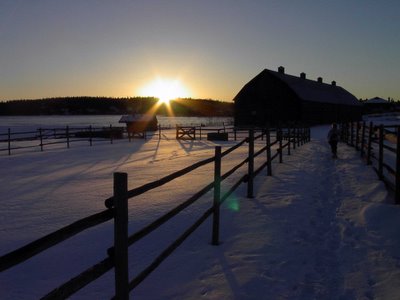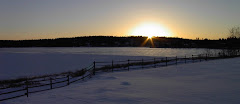
The picture is one I took a few years ago on my way back from Williams Lake. It is at the 108 Mile Heritage site on highway 97.
There is a distrubing trend that is occuring in BC.
As this province has its urban population increase and the rural population decreases the relative weight of rural communities drops. This drop in the population of rural communities has a few siginificant impacts on BC.
There are fewer people in BC that understand the land base, understand the impacts of resource extraction on the environment and ulitmately the underpinnings of our economy.
As the public is disconnected from the land base, they lose the connection to how we get our food, how weather impacts lives, what seasonality is, that bears are not cuddly and friendly, and why some activities on the land are better than others.
The public also suffers when they do not understand how the economy works. In BC we are very dependant on forestry for our well being, but few people seem to know how much wood a logging truck carries and what it might be worth (for the record, about 40 cubic metres of wood and if in the interior it has a value of about $2100 if they are sawlogs). People need to understand the relative values of different uses of the land so that we can make the best deicsions for the environment and the economy. I have heard too many people expouse the belief that Eco-tourism is in some way close to the same economic value as forestry.
BC is 95% crown lands (which are encumbered by aboriginal title) but the people that make the decisions about these lands are not living anywhere close to them. The decision makers have lots of data to work from, but very little understanding of what the data means on the ground.
A few things I have seen that reflect this are: a version of an LRMP that called for a major highway to be closed for three months of the year for wildlife reasons (and this is not what they had intended), a GIS generated map that had a lake on a slope (the lake was actually a ginseng field and I presume picked up from a satelite photo), and another map that had deadend roads at right angles in the middle of the mountains. People are presuming that the large volume data in front of them is accurate and there is nothing else needed to make a good decision.
What worries me the most is that the people that live out in rural BC are not treated as if the knowledge they have is valuable - be they aboriginal, logger, farmer or whatever. I have seen people trust information from books more than the people on the land. The most egregious example of this I witnessed was at a meeting a few years back in the interior. A person at the meeting was talking about this great book put out by a University press that had the best information about the region he had ever seen. He preceed to talk about the First Nations covered in the book as if they were all part of the past and no more. He did not clue in that one of the main informants for the book was sitting at the table. The complete and total assumption on his part that no one there could know as much as was in the book was stunning. All the locals could see how he was scrweing up and could see the wry smile on the Chief's face as some white guy was trying to tell him this University book was the source of knowledge about his people.
I have seen people treat loggers and roadbuilders as if they are incapable of having any understanding of the world around them.
What have ended end up with is lower quality decisions on how we manage our landbase. It is tiem to look at giving a much higher degree of power in the hands of rural residents to manage the land. My hope is that the ultimate end of the Treaty negotiations in BC will see one set of rural people have some real power over the lands.

No comments:
Post a Comment